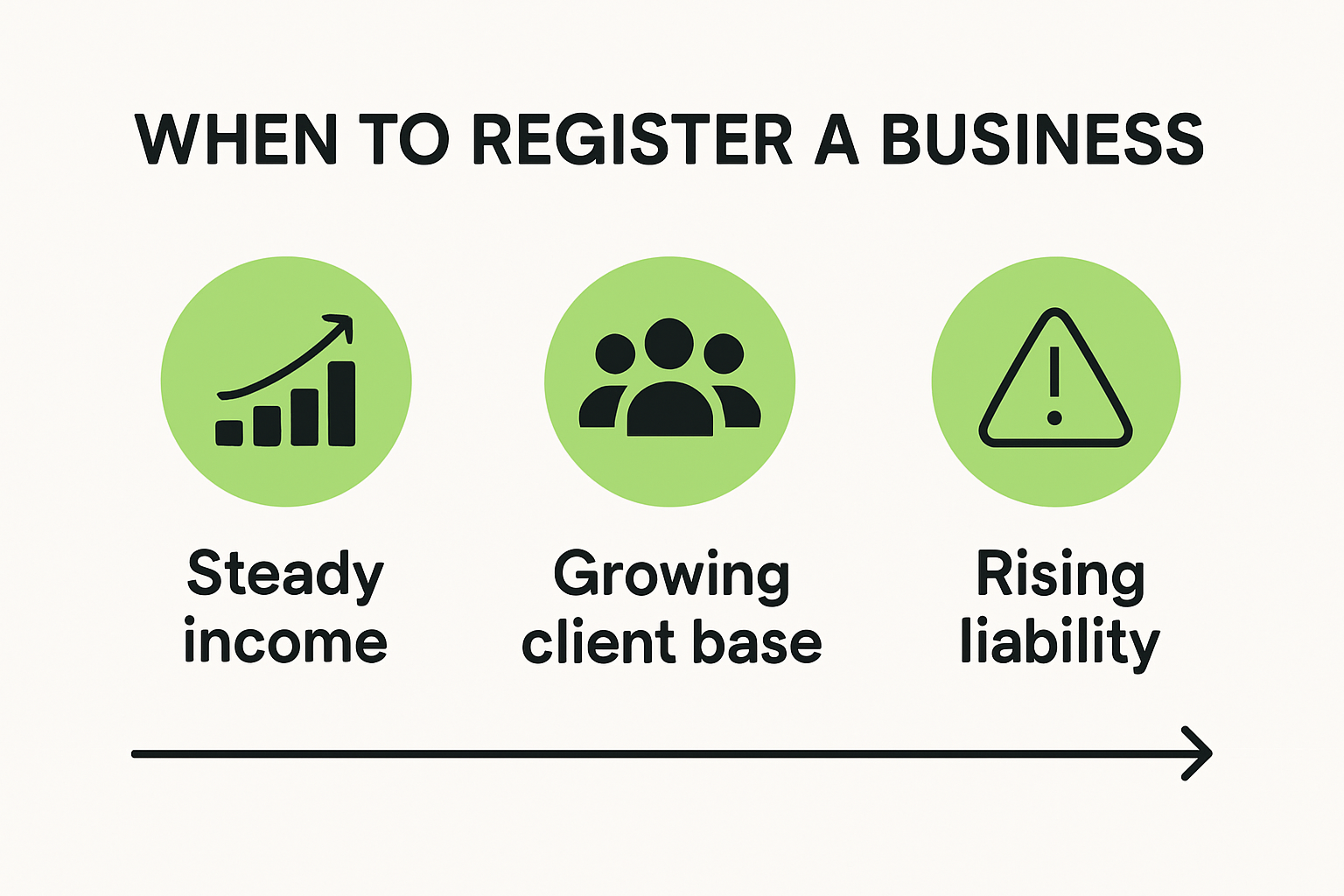
When to Register a Business: A 2025 Guide for Side Hustlers and New Founders
Turning your weekend hustle into a real business can feel like standing at the edge of a big decision. Most people wait for the perfect moment or worry about getting buried in paperwork. But it turns out, steady income is actually the number one sign you should register and it means you may be missing out on valuable legal protection and growth opportunities if you wait. The right timing can be a gamechanger and what you do next could shape your future success in ways you never expected.
Table of Contents
- Deciding The Right Time To Register
- Understanding Legal And Financial Triggers
- Evaluating Market And Personal Readiness
- Strategic Timing Considerations
- Legal And Tax Considerations For New Founders
- Choosing The Right Business Structure
- Tax Implications And Compliance
- Legal Protections And Risk Management
- Common Mistakes And How To Avoid Them
- Legal And Structural Missteps
- Tax And Financial Registration Errors
- Branding And Name Selection Blunders
- Expert Tips For Smooth Registration In 2025
- Digital Preparation And Documentation
- Technology And Efficiency Strategies
- Compliance And Future-Proofing
Quick Summary
Deciding the Right Time to Register
Timing is everything when transforming your side hustle into a legitimate business. Registering at the right moment can protect your venture and unlock critical opportunities. But determining that perfect window isn’t always straightforward.
Understanding Legal and Financial Triggers
Business registration isn’t just paperwork. It’s a strategic decision signaling your commitment to turning passion into profession. The U.S. Small Business Administration advises that registering establishes your business as a distinct legal entity, providing crucial personal liability protection.
Key indicators you might be ready to register include:
- Revenue Consistency: Generating steady income suggests your side project has real market potential
- Increasing Client Base: Multiple paying customers signal it’s time to formalize your operation
- Potential Liability Risks: Protecting personal assets becomes critical as your business grows

Evaluating Market and Personal Readiness
Research from Rice Business Career Development Office emphasizes understanding market conditions before registration. Economic trends and customer behavior can significantly impact your business’s success trajectory.
Wolters Kluwer experts recommend assessing several critical factors:
- Validate consistent market demand for your product or service
- Confirm you have sufficient financial resources
- Ensure you possess deep industry knowledge
- Evaluate your personal readiness and commitment
Strategic Timing Considerations
Registration isn’t just about meeting legal requirements. It’s a strategic move that unlocks tax benefits, credibility, and growth potential. Wait too long, and you risk personal financial exposure. Move too quickly, and you might waste resources before establishing proof of concept.
The sweet spot typically emerges when your side hustle demonstrates:
- Repeatable revenue streams
- Clear value proposition
- Growing customer interest
- Potential for scalability

Your business registration is more than a bureaucratic step. It’s a declaration of entrepreneurial intent, transforming your dream from a casual project into a professional venture.
Legal and Tax Considerations for New Founders
Founders often overlook the critical legal and tax landscape that can make or break their business venture. Navigating these complex terrains requires strategic planning and deep understanding of your business structure’s implications.
Choosing the Right Business Structure
The Internal Revenue Service highlights that selecting an appropriate business structure fundamentally determines your tax obligations and legal protections. OpenStax’s Entrepreneurship textbook outlines several primary business structures, each with unique characteristics:
- Sole Proprietorship: Simplest structure with minimal paperwork
- Partnership: Shared ownership with distributed responsibilities
- Limited Liability Company (LLC): Personal asset protection with flexible taxation
- Corporation: Complex structure offering robust legal separation
Here is a comparison table summarizing the key business structures discussed and their main traits, to help you quickly compare your options:
Tax Implications and Compliance
Understanding tax obligations is crucial for maintaining financial health. Different business structures trigger distinct tax reporting requirements. A sole proprietorship reports income on personal tax returns, while corporations face more complex filing processes.
Key tax considerations include:
- Employer Identification Number (EIN) acquisition
- State and federal tax registration
- Quarterly estimated tax payments
- Maintaining accurate financial records
Legal Protections and Risk Management
The U.S. Small Business Administration emphasizes that proper business registration provides critical legal protections. Registering establishes your business as a separate legal entity, which can shield personal assets from business liabilities.
Risk management strategies include:
- Comprehensive business insurance
- Clear contractual agreements
- Proper intellectual property protection
- Regular legal and financial consultations
Your business structure is more than administrative paperwork. It’s a strategic decision that impacts your financial future, legal exposure, and operational flexibility. Choose wisely, consult professionals, and remain adaptable as your venture evolves.
Common Mistakes and How to Avoid Them
Starting a business is an exciting journey, but the path is riddled with potential pitfalls that can derail your entrepreneurial dreams. Understanding and anticipating these common mistakes can save you time, money, and significant headaches.
Legal and Structural Missteps
Research from JD Supra reveals that operating as a sole proprietorship without forming a legal business entity is a critical error. This approach leaves your personal assets vulnerable to business liabilities.
Common legal mistakes include:
- Improper Business Structure: Failing to choose the right legal entity
- Inadequate Documentation: Skipping crucial legal agreements and contracts
- Intellectual Property Neglect: Not protecting your business ideas and brand
Protect yourself by consulting with a legal professional who can guide you through proper business formation and documentation. Consider structures like LLC or corporation that provide personal asset protection.
Tax and Financial Registration Errors
Avalara’s expert analysis highlights the complexities of tax registration. Many new founders make costly mistakes by over or under-registering for sales tax.
Key financial registration pitfalls to avoid:
- Registering for sales tax in unnecessary jurisdictions
- Failing to obtain proper tax identification numbers
- Misunderstanding state-specific tax obligations
- Neglecting to separate personal and business finances
The following table summarizes the most common registration and structure mistakes new founders make, and ways to avoid them:
Branding and Name Selection Blunders
American Military University’s business research emphasizes the critical nature of business name selection. Choosing a name without thorough research can lead to legal complications and brand confusion.
Avoid naming mistakes by:
- Conducting comprehensive trademark searches
- Checking domain availability
- Verifying name uniqueness across multiple platforms
- Considering potential international implications
Your business name is your first marketing tool. It should be memorable, meaningful, and legally sound. Take the time to choose wisely, as changing your name later can be costly and disruptive.
Remember, mistakes are part of the entrepreneurial journey. The key is to anticipate potential issues, seek expert advice, and remain flexible. Each challenge is an opportunity to learn and strengthen your business foundation.
Expert Tips for Smooth Registration in 2025
Registering a business in 2025 requires strategic planning and understanding of evolving digital landscapes. Navigating the registration process demands precision, foresight, and leveraging modern technological resources.
Digital Preparation and Documentation
The Internal Revenue Service recommends comprehensive digital preparation before initiating business registration. This means assembling a robust digital portfolio that demonstrates your business’s legitimacy and operational readiness.
Critical digital preparation steps include:
- Comprehensive Business Plan: Detailed document outlining your business model
- Financial Projections: Realistic revenue and expense forecasts
- Digital Identity: Consistent online presence across platforms
- Professional Website: Clean, informative digital representation of your venture
Technology and Efficiency Strategies
Modern business registration increasingly relies on technological efficiency. Entrepreneurs can leverage online platforms and government digital services to streamline their registration process. This approach reduces paperwork, minimizes errors, and accelerates administrative procedures.
Key technological strategies:
- Use state-specific online registration portals
- Utilize digital signature technologies
- Implement cloud-based document management systems
- Integrate automated compliance tracking tools
Compliance and Future-Proofing
Successful 2025 business registration extends beyond immediate legal requirements. Forward-thinking founders must anticipate regulatory changes, technological shifts, and emerging market dynamics.
Strategic compliance considerations:
- Regulatory Adaptability: Stay informed about evolving business regulations
- Technology Integration: Choose scalable registration platforms
- Cybersecurity Preparedness: Protect sensitive business registration data
- Cross-Platform Compatibility: Ensure registration documents work across different systems
Your registration process is more than a bureaucratic checkbox. It’s a strategic investment in your business’s future. Approach it with meticulous planning, technological savvy, and a vision that extends beyond immediate administrative requirements. Successful registration in 2025 means being prepared not just for today’s landscape, but for the dynamic business environment of tomorrow.
Frequently Asked Questions
When should I register my side hustle as a business?
Register your side hustle as a business when you have steady revenue, an increasing client base, or potential liability risks. These factors indicate market viability and readiness to formalize your operations.
What are the different types of business structures?
The main types of business structures include Sole Proprietorship, Partnership, Limited Liability Company (LLC), and Corporation. Each has unique legal and tax implications, so choose one that best fits your business needs.
What are the tax implications of registering my business?
Registering your business alters your tax obligations. Different structures have distinct requirements; for example, sole proprietorships report income on personal tax returns, while corporations face more complex filing processes.
How can I avoid common registration mistakes?
Avoid common registration mistakes by choosing the right business structure, ensuring proper documentation, and protecting your intellectual property. Consulting with legal and financial professionals can help you navigate these complexities.
Take the Guesswork Out of Business Registration
Feeling stuck between steady side hustle income and the right time to officially register your business? The article highlights the confusion and risk of missing the sweet spot for legal protection and growth. If you want to avoid common mistakes like picking the wrong structure, running into tax surprises or risking your personal assets, it is time to move beyond guesswork.
siift gives you clear personalized guidance on every step from evaluating your market readiness to choosing your ideal business structure. You do not have to figure out complex legal or financial triggers alone. With siift, you get insights and action plans that match your unique journey and timeline. Why wait and risk delays or costly errors when you can get support tailored just for you? Start planning smarter now and turn your big decision into your next big win.

see where you stand





.svg)
.svg.png)



.svg)

